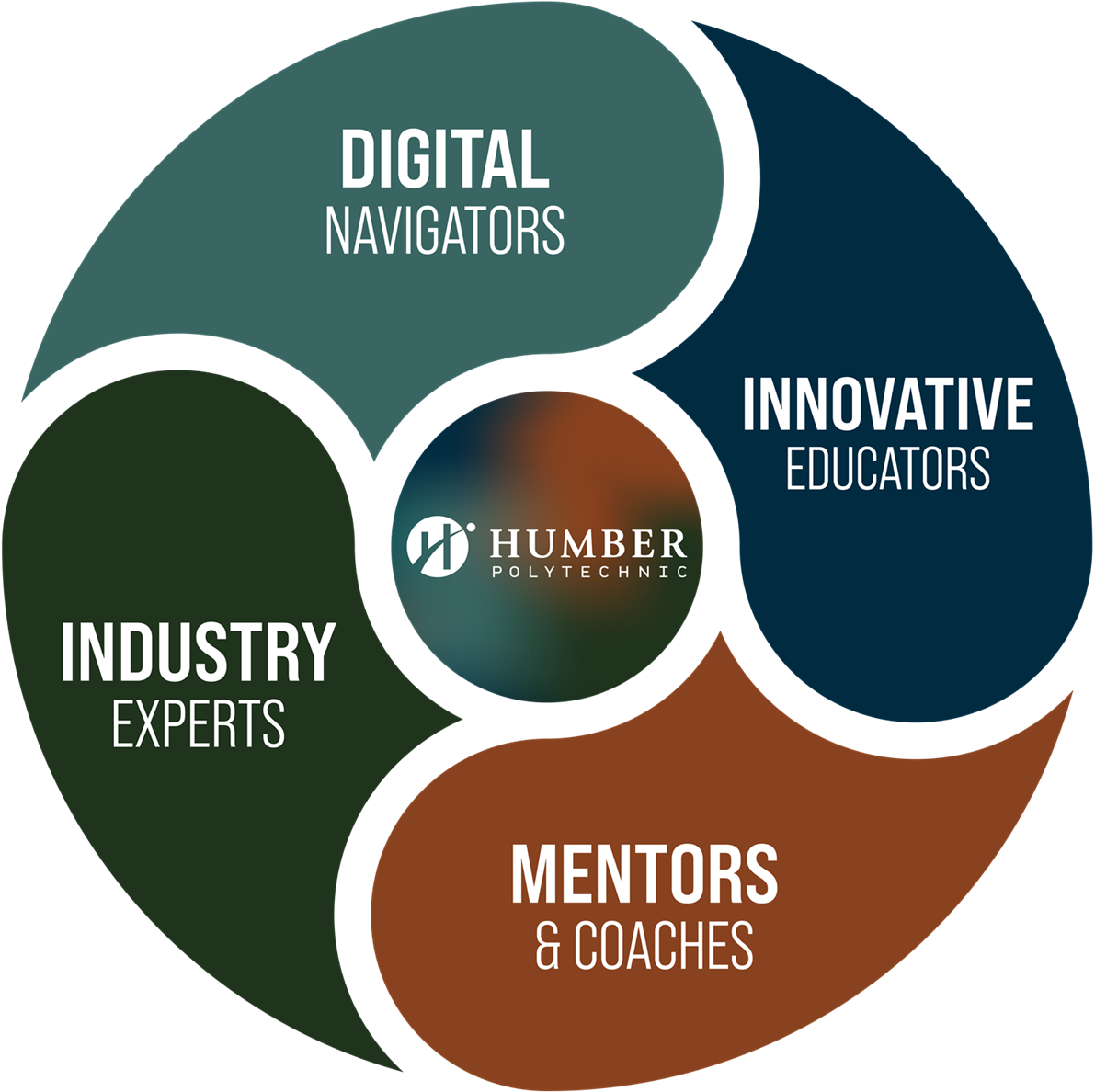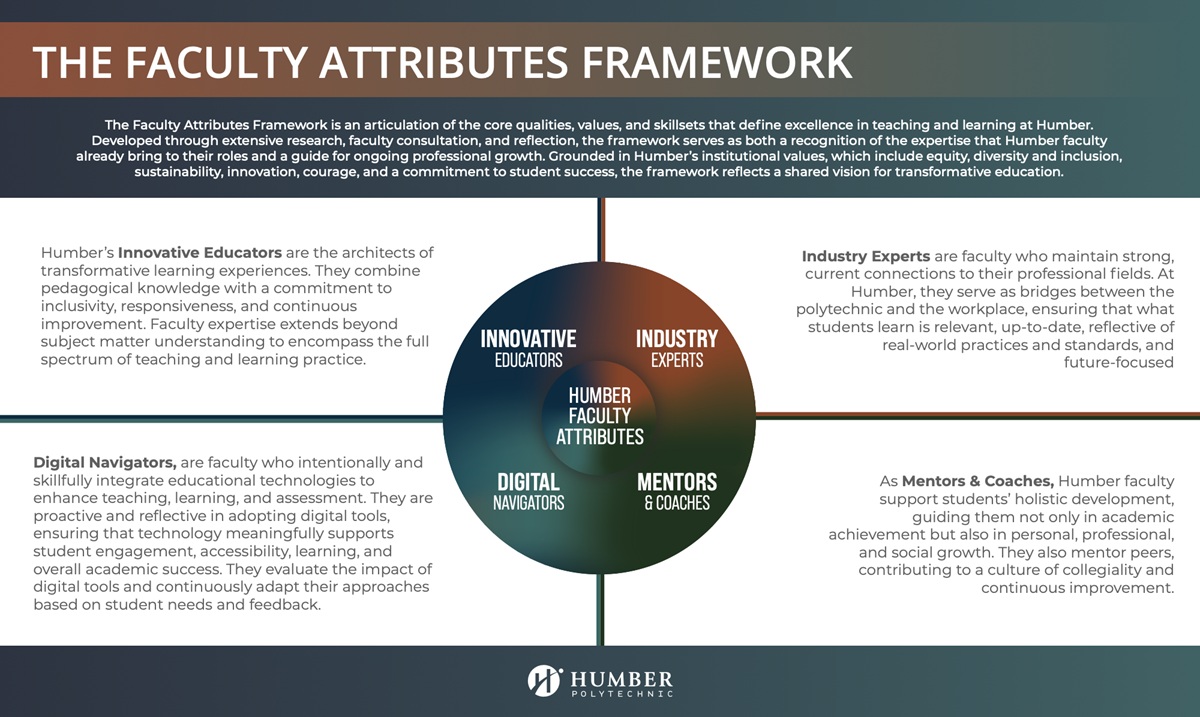APPLICATIONS AND CORE FACULTY ATTRIBUTES
The Faculty Attributes Framework serves as both a recognition of the expertise Humber faculty bring to their roles and as a guide for continued professional growth. It reflects a shared commitment to excellence in teaching, learning, and academic leadership. Discover how the Faculty Attributes Framework is applied in practice and explore the four core attributes that shape and support innovative, future-ready educators at Humber.
KEY FACULTY ATTRIBUTES

The four key faculty attributes reflect the depth and breadth of the knowledge, values, and practices that Humber faculty contribute to the Polytechnic.
- Innovative Educators
- Industry Experts
- Mentors & Coaches
- Digital Navigators
Educators
Humber’s Innovative Educators are the architects of transformative learning experiences. They combine pedagogical knowledge with a commitment to inclusivity, responsiveness, and continuous improvement. Faculty expertise extends beyond subject matter understanding to encompass the full spectrum of teaching and learning practice.
- Effective Teaching Skills: Understand how students learn and use proven, up to date teaching strategies to keep students engaged.
- Curriculum Designers: Create up to date, relevant, well-structured courses that build employability skills for students.
- Effective Assessors: Use diverse assessment methods to measure learning and give helpful, timely feedback to support student growth.
- Inclusive Approach: Create accessible, culturally responsive learning environments that recognize and value the diversity of students’ backgrounds, identities, and experiences.
- Lifelong Learners: Engage in on-going self-reflection and professional development, seeking feedback and staying current with pedagogical innovations and best practices.
Coaches
As Mentors & Coaches, Humber faculty support students’ holistic development, guiding them not only in academic achievement but also in personal, professional, and social growth. They also mentor peers, contributing to a culture of collegiality and continuous improvement.
- Personalized Support: Supportive guides who help students navigate their learning journey at Humber. Recognizing each student’s unique strengths, goals and challenges, they offer personalized guidance, encouragement, and feedback.
- Skill Builders: Help students strengthen both technical and core transferable skills (e.g. critical thinking, collaboration, communication, resilience and problem solving) for lifelong employability.
- Role Models: Exemplify professional, ethical, and inclusive practices in their interactions with students and their colleagues at Humber and beyond.
- Collaborative Teachers: Involve students in shaping their learning experience and encourage shared responsibility and self-directed growth.
- Feedback Culture: Create and cultivate an environment where students and colleagues can give and receive constructive feedback for on-going growth and development.
- Co-Learning: Create a learning space where both students and faculty learn from each other, recognizing that students often bring new perspectives and academic and career experiences that enrich the learning process.
Experts
Industry Experts are faculty who maintain strong, current connections to their professional fields. At Humber, they serve as bridges between the polytechnic and the workplace, ensuring that what students learn is relevant, up-to-date, reflective of real-world practices and standards, and future-focused.
- Current Professional Knowledge: Actively engaged in their fields, staying current with new trends to bring firsthand knowledge of new advancements, technologies, and best practices into their teaching.
- Real-World Learning: Design projects and activities that reflect real-world challenges and professional contexts to prepare students for their future careers.
- Industry Connections: Cultivate relationships and build partnerships that give students access to guest speakers, job placements, and collaborative projects that enhance student learning and employability.
- Relevant Content: Engage in on-going, continuous improvement to ensure that content remains aligned with evolving industry standards and regulatory requirements to ensure the on-going relevancy of the learning experience for students.
Navigators
Digital Navigators are faculty who intentionally and skillfully integrate educational technologies to enhance teaching, learning, and assessment. They are proactive and reflective in adopting digital tools, ensuring that technology meaningfully supports student engagement, accessibility, learning, and overall academic success. They evaluate the impact of digital tools and continuously adapt their approaches based on student needs and feedback.
- Digital Fluency: Comfortable using a wide-range of educational technology, digital tools, applications and platforms – and help students navigate digital spaces and engage critically with technology, including emerging technologies such as AI.
- Purposeful Use of Tech: Adept at choosing digital tools carefully to align with learning outcomes, enhance engagement, support diverse learning needs and prepare students for their chosen careers.
- Adaptability in Tech: Staying current with technology trends and adjusting approaches by evaluating impact, student learning outcomes, and improved learning experiences.
- Leaders in Tech: Sharing technology tips and best practices with colleagues, helping the whole institution embrace sound, ethical practices in embedding technology in teaching and learning.
Download the Faculty Attributes Framework

Looking for a quick reference to reflect on your professional journey or share with your team? Download the infographic for a visual snapshot of the four core faculty attributes—Innovative Educators, Industry Experts, Mentors & Coaches, and Digital Navigators. It captures the essence of each attribute and how they work together to support excellence in teaching, learning, and student success at Humber.
Download FA Framework PDFReady to Reflect?
Take a moment to explore which faculty attributes you already embody—and where you might grow next. Our self-reflection tool is designed to help you recognize your strengths, spark new insights, and guide your ongoing professional journey.
START SELF-REFLECTION